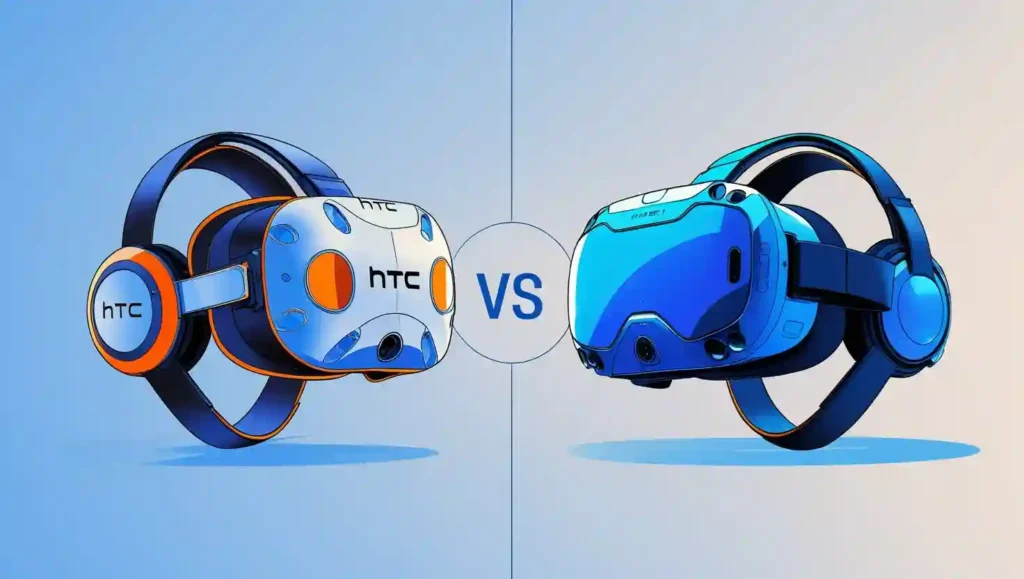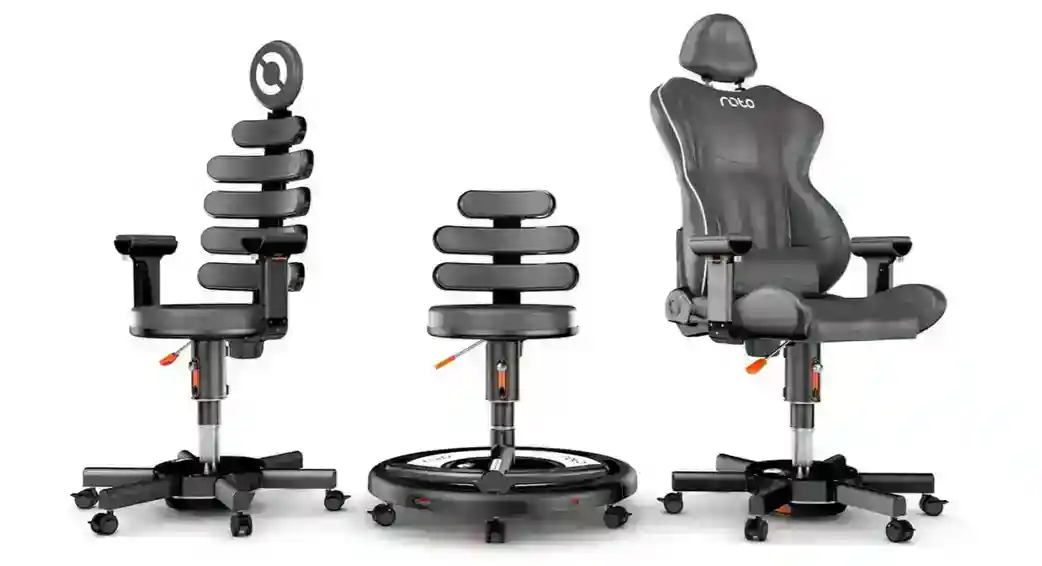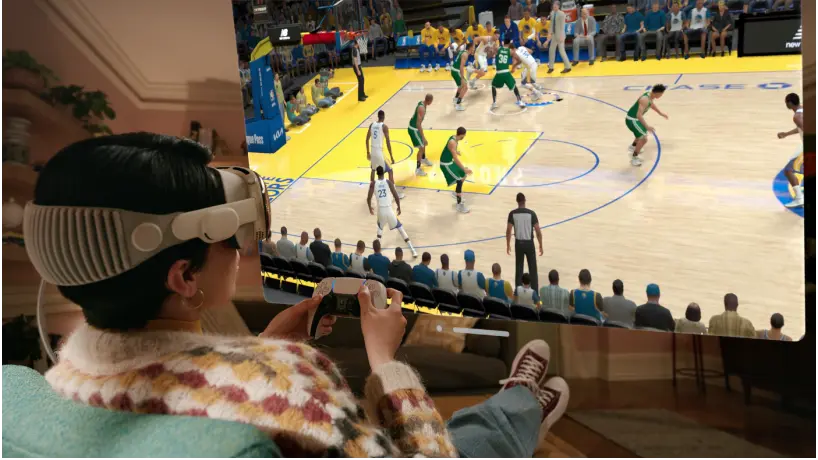PC VR has greatly impacted the gaming industry, as well as the mainstream VR headset you see in the news these days. But Meta vs HTC: Which PC VR should you buy in 2025?
It is not an exaggeration to say that PC VR (s) pioneered this field. They are not impractical prototypes from the past, they are fully functional entertainment, and productivity devices now.
There are two main players in the PC VR market, the first one being HTC this company made Vive headsets popular among hardcore fans of VR. Another main player is Meta who made Oculus Rift headsets and now produces Quest series headsets.
In addition to Meta and HTC, several other companies are involved in the PC VR market. These companies include:
- Valve: Valve is the company behind the SteamVR platform and the Index headset.
- HP: HP is the company behind the Reverb G2 headset.
- Pimax: Pimax is the company behind many high-end VR headsets.
Table of Contents
The PC VR Landscape
No one can deny that PC VR in general has shifted from a niche interest to a mainstream product, especially in the world of gaming. But this shift is very dependent on the technological advancement made in recent years.

The most limiting factor that limited the growth of VR in the 2010s was graphical processing power which was simply not available at the time. Now Powerful GPUs have become more accessible even to common users. You can get powerful GPUs in the market and despite the complaints related to pricing you don’t need to spend more than 1000$ (for a full PC build) if simply want to play VR games).
But if your interest is in development then you need more than that.
Things that are helping make PC VR mainstream
So what’s going on with PC VR that we are talking about? Simple features or trends that were not available are now easily accessible.
- Wireless Freedom: Standalone VR headsets with PC connectivity offer the best of both worlds the high-fidelity graphics of PC VR with the untethered experience of standalone devices.
- Social VR: Platforms designed for social interaction are gaining traction, allowing users to connect, collaborate, and experience virtual worlds together.
- Hybrid Experiences: Developers are exploring mixed-reality applications that blend virtual elements with the real world, opening up new possibilities for gaming and productivity.
- Increased Accessibility: As technology improves and prices become more competitive, PC VR is becoming more accessible to a wider audience.
- Content Diversification: The range of VR content has expanded beyond gaming to include educational tools, virtual tourism, and even therapeutic applications.
- Mainstream Acceptance: VR is increasingly being featured in popular culture, from movies and TV shows to music videos and advertising, contributing to its normalization.
These are some factors that have contributed to shifting PC VR from a niche to a mainstream technology that everyone knows.
Meta’s PC VR Approach
Meta’s take on VR is to provide versatile headsets to consumers at affordable prices. They try to balance the gap between standalone VR and high-fidelity PC VR experiences. Users can use the headset on its own becoming a standalone headset and if needed can be connected to a computer for high-fidelity gaming.

Advantages of Meta’s headset
Meta’s major selling point is that they offer headsets for everyone, from first-timers to veterans in the field. They provide every option depending on your needs and budget.
The headset with the ability to be used as a standalone as well as a PC is one of the advantages but you have the option to connect with your PC wirelessly allowing the users to move freely. Users can use the Air link to seamlessly connect their headset to the computer.
Meta also excels in user-friendly interfaces and intuitive tracking. The Quest Pro takes this a step further with advanced eye tracking, opening up new possibilities for interaction and immersion.
The Drawbacks of meta
Despite its features, Meta’s PC VR system is not without its challenges. Weight and battery life remain concerns, especially for extended gaming sessions. Users may find themselves needing to take breaks or change batteries mid-session.
But you can solve this problem with the Top 5 Meta Quest products you should buy!
Occasional fluctuations in clarity and accuracy have also been reported, especially during constrained use. These issues, while not necessarily decisive, can detract from the overall VR experience.
HTC’s PC VR: A Premium Experience
HTC’s approach to PC VR hinges on its flagship offerings, most notably the Vive Pro 2 and Vive XR Elite. These headsets emphasize high-end capabilities and cater to a more sophisticated user base, often prioritizing visual stability and advanced capabilities.

HTC is generally focused on providing a premium VR experience, although at a higher price than some competitors.
Where HTC Shines
PC VR headsets from HTC offer several compelling advantages. Visual accuracy is a natural experience, with headsets like the Vive Pro 2 delivering sharp viewing angles, wide fields of view, and high refresh rates, resulting in a truly immersive viewing experience.
Control is another thing where HTC excels, using traditional base stations for accurate and precise motion control.
Furthermore, HTC has a long-standing reputation for building robust, professional-grade VR headsets, making them a popular choice for serious VR enthusiasts and their developers.
The Downside
Despite its strengths, HTC’s PC VR offerings face some challenges. Their high prices make them less accessible to budget-constrained consumers.
Many HTC systems rely on closed connections, which can feel sluggish and cumbersome compared to wireless solutions.
Finally, setting up HTC’s VR systems can be more complex and time-consuming than some competing platforms, requiring a greater level of technical and engineering expertise.
Head-to-Head: Meta vs. HTC
While there it is unlikely that you will make the wrong choice with either headset. This section will provide a head-to-head comparison between the two.
HTC offers higher resolutions with a wider field of view making it an excellent choice for an open-world scenario. Overall HTC will give a better experience but the only drawback is its price tag.
On the other hand, Meta, while still offering good visuals, often prioritizes a balance between graphical quality and performance, especially given the wireless capabilities of its headsets.
Conclusion
Well, my final thought on these PC VR headsets is that it is safe to go with the Meta Quest series for most consumers and go for HTC only if you know what you really want as it’s hard to justify its price tag.
But you will not regret either of them and I can guarantee that you will have an amazing experience.








1 thought on “Meta vs HTC: Which PC VR should you buy in 2025?”